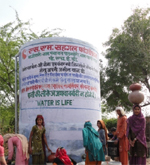Mewat District
Patkhori's water solutions - A case study from the work of SM Sehgal Foundation in Mewat, Haryana
Posted on 14 Jun, 2011 05:27 PM Community water tank
Community water tank
S M Sehgal Foundation awarded the “3rd National Ground Water Augmentation Award-2009” by Ministry of Water Resources
Posted on 28 Mar, 2011 04:44 PMThe award, instituted by the Ministry of Water Resources, Government of India, is given for “innovative practices of groundwater augmentation through rainwater harvesting and artificial recharge.” The award to S.M.
Jal Chetna Yatra Report by Institute of Rural Research and Development (IRRAD)
Posted on 09 Apr, 2010 03:26 PMInstitute of Rural Research and Development (IRRAD) organised "Jal Chetna Yatra" where three groups started the yatra from three different blocks of Mewat on 19th March, sensitizing the community towards water issues and collect at the district headquarters on 22nd March, World Water Day.
Click on the attachment to read the entire report.
Jal Chetna Yatra, S M Sehgal Foundation, Mewat, Haryana
Posted on 15 Mar, 2010 12:48 PMLocation : Villages of Mewat, Haryana
Organiser : S M Sehgal Foundation
District human development report card for 10 districts- the PAHELI report
Posted on 01 Jun, 2009 03:46 PMThe PAHELI report (Peoples' Audit of Health Education and Livelihoods) is a rapid assessment of the prevailing status of human development in a district and covers four major sectors: life and livelihoods, water and sanitation, mother and child health, and education and literacy. The design and execution of PAHELI was done by Pratham and PAHELI district partners.
Integrated and sustainable rural water management for improving water quality in Mewat, Haryana
Posted on 18 May, 2009 04:06 PMThis paper published by the Sehgal Foundation presents a case
Harvesting water harnessing life: A case study of Kotla village in Mewat, Rajasthan
Posted on 14 May, 2009 01:31 PMHARVESTING WATER HARNESSING LIFE
A Case Study of Kotla Village in Mewat
MEWAT: STATISTICS AT A GLANCE
| People | Meo Tribals |
| Geographical Location | Foothills of Aravalis |
| Average rainfall | 336mm-500mm |
| Occupation of villagers | |
| a) Agriculture & Animal Husbandry b) Others | 58% 42% |
| Cultivated area | 80% |
| Irrigated area | 44% |
| Source of water for irrigation | Ground water- 95% |
| Water Quality | Mostly brackish |
| Ground water depletion rate | Over 25cms a year |
MDA & IRRAD : Water projects in Mewat
Posted on 07 May, 2009 10:11 AMFrom: IRRAD Connect Volume 6 Image & Content Courtesy:IRRAD 
In Mewat, the ground water is depleting at the rate of about 25 cms a year and salinity is increasing in many parts. The rising water salinity is affecting crop yield and limiting the choice of crops that can be grown. About 80% of the total geographical area in Mewat is cultivated. Of this total cultivated area, only 44% falls under the irrigated area, the rest is rain fed area. For the irrigated area the source of water is almost exclusively (95%) ground water, but it is very limited, generally enough only for one crop a year. It also includes pockets of saline water which is not fit for cultivation of most of the crops grown in that area. About 30% of households own wells or tube wells. Fast ground water depletion and seasonal variation of tube well yields is a matter of concern leading to low crop intensity. This is especially true in the villages where IRRAD is working. To check these rising water concerns a tailor made, integrated water management plan was needed for each village, with the first step being the study of topography, water flow, soil characteristics and traditional knowledge. Subsequently, the designing of appropriate interventions to harness and conserve water is undertaken. To this effect, IRRAD has carried out technical interventions like the check dams, gully plugs, recharge wells, soak pits, roof water harvesting etc. Taking water as an entry point of development work, IRRAD has intervened in many villages, expanding its activities to 17 villages.